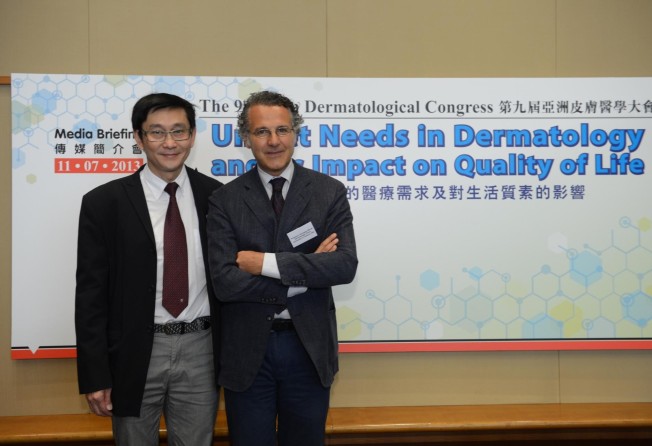The skinny on eczema cases in Hong Kong and Asia-Pacific

Eczema, one of the most common chronic childhood illnesses, is more than skin deep. A regional study conducted last year on more than 1,000 sufferers from one year old to 16 years old found that 47 per cent also have food allergies and 30 per cent develop asthma and rhinitis.
Hong Kong was among the 12 Asia-Pacific countries involved in the study commissioned by a biopharmaceutical company. The results were announced at the 9th Asian Dermatological Congress held here two weeks ago.
"More than 50 per cent of patients will go on to develop asthma and allergic rhinitis if the disease is not managed properly," says Professor Ellis Hon of Chinese University's department of paediatrics, who was involved in the study.
He says eczema, virtually unknown 30 years ago, is increasingly common. It is characterised by chronic inflammation of the skin that causes blisters and itchy rashes.
"One reason has to do with the growing awareness of the problem. Another has to do with an environment where rising pollution has made people more allergic," Hon says.
About 60 per cent to 70 per cent of cases in Hong Kong are induced by family factors, he adds. These include demanding parents who expect too much of their children, leading to undue stress that triggers the immune system to overreact to allergens from food or the environment.
"I have a young patient in his 20s whose parents forced him to study law and also interfered in his romantic life. The stress led to a sudden eczema relapse and he developed swollen rashes all over the body," he says.
"In another case, the mother of a little girl suffering from eczema bought more than 10 kinds of ointment to apply on her skin for more than 30 times a day, which further added to the girl's stress and worsened the condition."
The study, which involved an online poll of the patients' mothers, also found that parents spent a lot of time dealing with their children's eczema - an average of nearly four hours per day.
In Hong Kong, mothers on average spent nearly three hours per day, with 27 per cent spending more than six hours per day helping ease the condition. Fifty-six per cent said they spent nearly HK$4,000 in the past year on treatment.
Eczema, also known as atopic dermatitis, can affect anyone. Up to 3 per cent of adults and up to 20 per cent of children are afflicted with the disease.
Most of the cases appear before the age of five and the condition will generally ease off by the age of 15. But young sufferers need to contend with frequent flare-ups that last an average of five days.
In the Asia-Pacific region, four in 10 children experience more than six flare-ups per year. In Hong Kong, 30 per cent suffer from a flare-up more than 20 times a year, the study shows.
"It is a distressing disease associated with scratching, anxiety and sleep disturbance. Our study showed that sufferers have a poor quality of life," Hon says. "More than 60 per cent of children avoided swimming and other sports over the past week. A similar percentage reported feeling embarrassed, self-conscious and upset."
Sometimes, parents take the wrong approach with treatment, Hon says.
"We ask them not to let their children take bubble baths, but they do it anyway. If doctors prescribe steroids to treat the condition, some parents think that the doctors are bad. The parents seek alternative treatment, with some taking a lot of herbal supplements.
"Although Chinese medicine has strong scientific backing, many people abuse it. Some … may contain heavy metals and even agricultural poison.
"The proper use of steroids can actually help treat eczema well," Hon says. "Doctors can also prescribe non-steroid medicine to regulate the immunity system to improve the condition. Applying emollient after a bath can also help soothe the condition."
Tellingly, another study presented at the congress found that more than half of acne sufferers had never sought help for the skin condition. More than 1,000 people from India, Malaysia, the Philippines and Singapore were polled.
Nearly half of the respondents were embarrassed and self-conscious about the condition; 15 per cent said they felt hopeless.
Professor Giuseppe Micali, of the University of Catania's dermatology clinic in Italy, says acne can result in severe psychological problems. "Patients suffer from low self-esteem, poor relationships, anxiety, depression and even higher unemployment rate," Micali says.